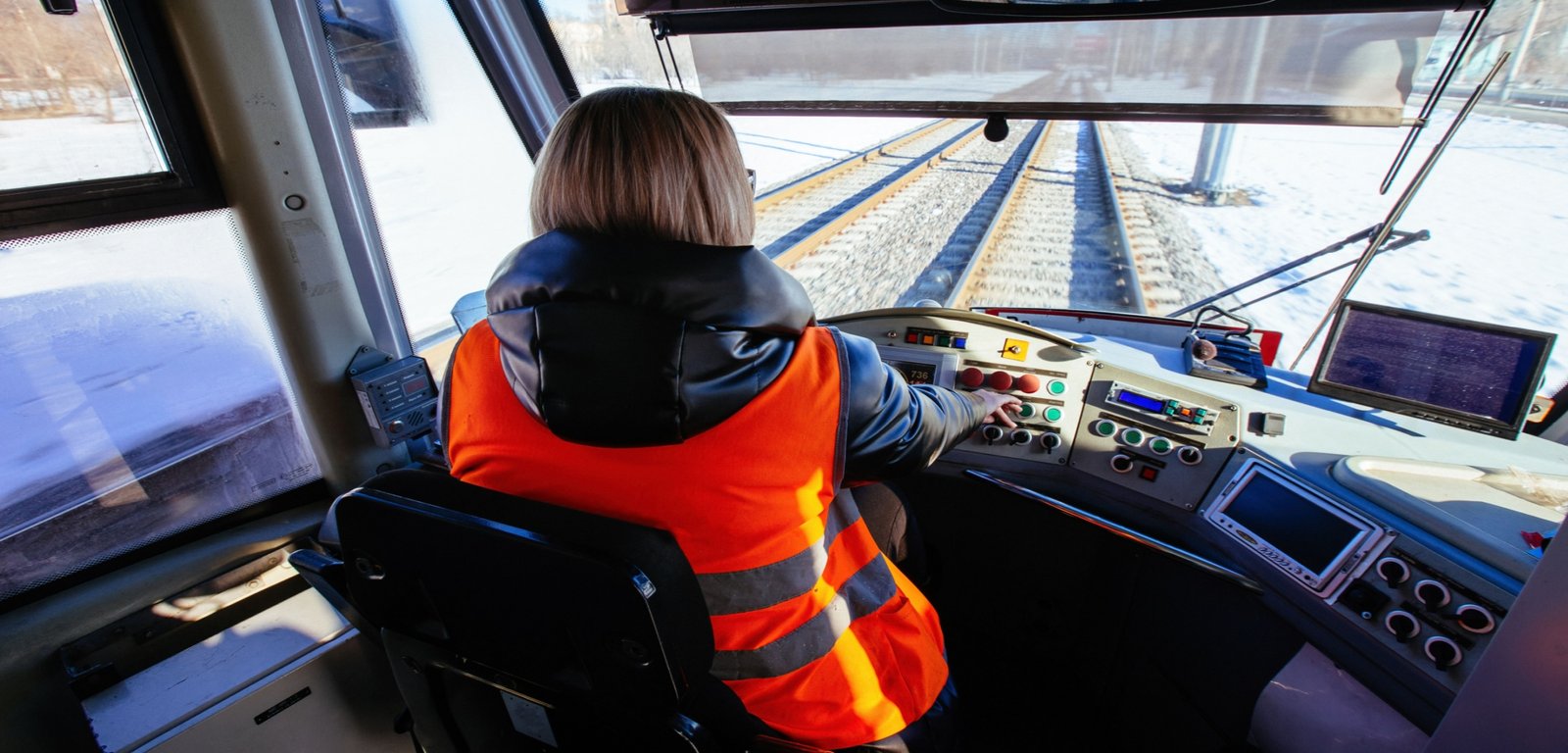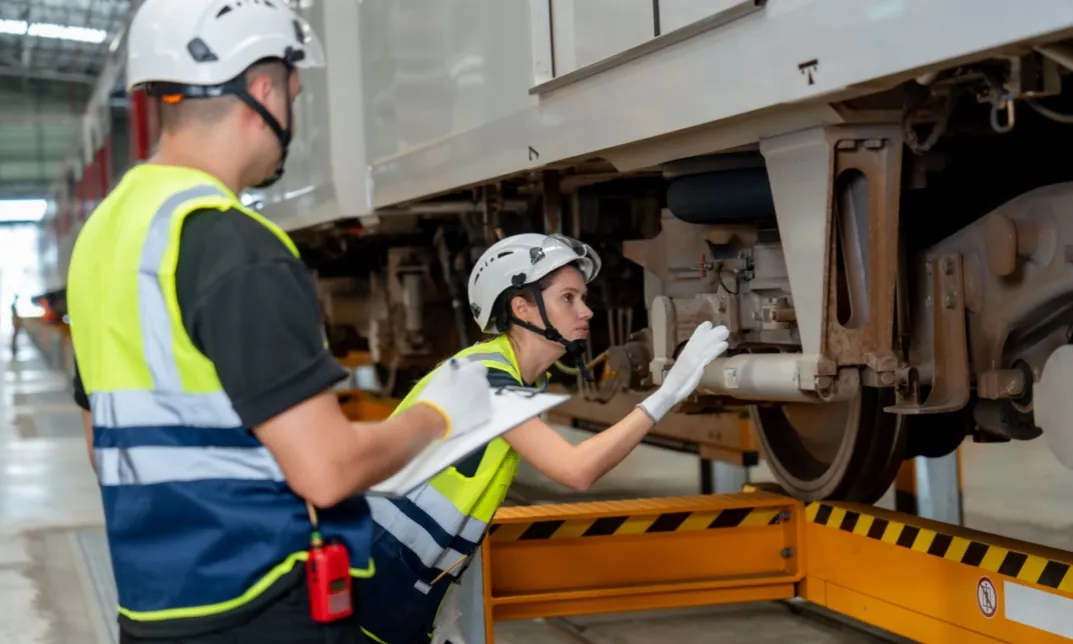No products in the cart.
Have you ever thought about what it takes to become a train operator in the UK? With good pay, averaging around £48,500 a year, and chances to move up in your career, this job is both rewarding and important for the country’s transport system. Whether you’re interested in driving trains or looking for career growth, learning how to become a train operator can help you start this exciting journey.
In this blog, we will cover everything you need to become a professional train operator.

What is a Train Operator?
A train operator is a skilled professional responsible for the safe and efficient operation of trains on a railway network. This role involves controlling the train’s speed and movement, adhering to schedules, and ensuring compliance with safety regulations. Train operators must be vigilant and responsive to signals, track conditions, and any potential hazards to ensure the safety of passengers and freight. They also communicate with dispatchers and other railway staff to coordinate train movements and handle any emergencies or operational issues that may arise during their shifts.
What Does a Train Operator Do?
Before you start on your journey, it’s crucial to understand what a train operator does. Their primary role is to operate trains safely and efficiently, whether they’re transporting passengers or goods. However, their responsibilities go beyond just driving. Operators must follow strict safety protocols, communicate with control centres, and handle unexpected situations that may arise during a journey.
Moreover, they need to ensure they remain punctual while dealing with all kinds of conditions, from weather disruptions to signal issues. Therefore, it’s a job that requires focus, patience, and the ability to make quick decisions under pressure.
How to Become a Train Operator?
If you are interested in learning how to become a train operator, the steps are fairly straightforward but require commitment.
Meet Basic Requirements
To start, you must meet some basic eligibility criteria. In most cases, you need to be at least 18 years old, although some companies may require you to be older. You will also need a clean criminal record and a valid driver’s licence. Some rail companies may ask for additional qualifications, such as GCSEs in Maths and English, as strong communication skills are vital for this job.
Undergo Medical and Fitness Tests
Train operators need to be in good health, both physically and mentally. As a result, you’ll be required to pass a medical exam to check your vision, hearing, and overall fitness levels. Moreover, there may be psychological tests to assess your ability to remain calm under stressful situations.
Get Proper Training
Once you’ve met the basic requirements and passed the medical tests, you will need to undergo extensive training. Most companies offer structured training programmes, which can last anywhere from a few months to over a year. During this time, you’ll learn the technical skills needed to operate a train, including how to handle the controls, read signals, and follow safety procedures.
Pass Written and Practical Exams
The training isn’t just hands-on. You’ll also need to pass written exams that test your knowledge of rail safety, signalling systems, and emergency procedures. In addition, practical tests will assess your ability to operate a train safely. These exams are essential to ensure that you are ready for the responsibility of transporting passengers or cargo.
Gain On-the-Job Experience
After completing your formal training, the next step involves gaining experience on the job. You may start by working under the supervision of more experienced operators before you’re allowed to operate a train independently. This period is crucial for honing your skills and gaining the confidence needed to handle the day-to-day challenges of the role.
Skills Needed To Become a Train Operator
Learning how to become a train operator involves more than just meeting the basic qualifications and completing training. Certain skills are essential for success in this career:
- Technical Proficiency: Understanding how trains and their systems work is crucial. Thus, they should have a good grasp of the mechanical aspects of the trains they operate, including the signalling systems, brakes, and safety features. This technical knowledge helps in diagnosing and resolving minor issues that may arise during a journey.
- Safety Awareness: They must have a strong understanding of safety regulations and protocols. Being aware of safety measures not only protects passengers but also ensures compliance with legal standards. A commitment to safety is fundamental in preventing accidents and maintaining a safe working environment.
- Time Management: Punctuality is a significant part of a train operator’s role. Operators need to manage their schedules efficiently, ensuring that trains depart and arrive on time. This skill also includes the ability to adapt quickly if delays occur, allowing for effective rerouting or communication with control centres.
- Adaptability: The rail industry can be unpredictable, with changes in schedules, weather conditions, or emergencies arising without warning. Train operators must be adaptable and flexible in their approach to work, allowing them to respond effectively to various situations as they occur.
- Numerical Skills: They often need to work with numbers, whether calculating travel times, interpreting signal codes, or managing logistical details. Strong numerical skills help ensure accurate calculations and effective time management during operations.
- Record Keeping: Accurate record-keeping is a key part of a train operator’s responsibilities. Operators must log their activities, including departures, arrivals, and any incidents that occur during their shifts. Attention to detail in this area is crucial for compliance and for future reference.
- Calm Under Pressure: Trains operate in a wide range of conditions, from adverse weather to crowded stations. Therefore, staying calm and composed under pressure is a must. You’ll often have to make quick decisions and respond to unexpected events, such as delays or breakdowns.

Qualifications and Career Progression
While formal education beyond secondary school is not always required, qualifications in relevant fields can enhance your chances. For example, a diploma or degree in transportation or engineering might give you a competitive edge. Once you’re employed, there are often opportunities to progress into more senior roles. For instance, some operators move into management, while others may specialise in operating specific types of trains, such as freight or high-speed services.
As you gain experience, you can also train to become an instructor, helping new recruits learn the ropes. Therefore, becoming a train operator is not the end of the road, but rather the beginning of a potentially long and fulfilling career in the rail industry.
Job Positions and Salaries
The UK rail industry offers diverse career opportunities essential for keeping trains running smoothly. In this section, we explore key roles within train operations and their potential salaries. From train drivers to conductors and managerial positions, discover the rewarding opportunities available in rail transport.
- Train Driver: £30,000 to £65,000 per year.
- Train Conductor: £30,687 per year.
- Trainee Train Driver: Starting from £24,304 per year.
- Train Driver Instructor: £55,000 to £70,000 per year.
- Train Driver Manager: Approximately £72,650 per year.
Final Thoughts
So, now you know how to become a train operator. While the path to getting there involves meeting strict requirements and undergoing rigorous training, it can be a highly rewarding career for those who enjoy working in transportation. They play a crucial role in keeping people and goods moving efficiently across the country.
If you possess the right mix of technical skills, focus, and determination, then this career might be a perfect fit for you.








